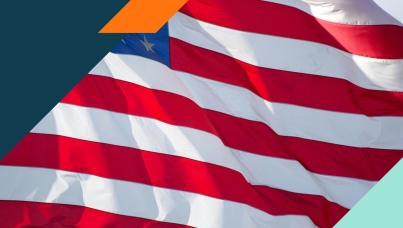Republicans retain advantage over Democrats on key issues of the economy, crime
Washington, DC, October 23rd, 2022 - More Americans, as well as registered voters, trust the Republican Party over the Democratic Party when it comes to handling the economy, crime, inflation, and gas prices, according to a new ABC News/Ipsos poll. Republicans’ advantages on these issues have not changed from ABC News/Ipsos polling two months ago. On the other hand, slightly more Americans now trust the Democratic Party when it comes to handling abortion – an eight percentage point change from August. Among registered voters, nearly half say their vote in November will be indicative of how they feel about President Joe Biden (30%) or former President Donald Trump (19%), while a similar number say the midterms aren’t about either man.
Looking to the future of America’s two major political parties, the majority of Republican registered voters believe Trump, Gov. Ron DeSantis (R-FL), Sen. Ted Cruz (R-TX), and Sen. Tim Scott (R-SC) should have a great deal or good amount of influence on the future of the Republican Party, eschewing those who have sometimes found themselves at odds with Trump, such as former Vice President Mike Pence, Sen. Mitt Romney (R-UT), and Rep. Liz Cheney (R-WY). On the other side, a strong majority of Democratic registered voters are looking to former President Barack Obama to have influence on the party’s direction, as well as Biden, Vice President Kamala Harris, Sen. Bernie Sanders (I-VT), Sen. Elizabeth Warren (D-MA), and Rep. Alexandria Ocasio-Cortez (D-NY).
Detailed Findings:
1. As public opinion continues to show the economy and inflation as major issues facing the country, Americans and registered voters alike continue to give Republicans the advantage on handling these issues. Overall, views on which party is better at handling several key issues remain mostly unchanged from early August.
- Thirty-six percent of Americans trust Republicans to do a better job handling the economy, compared to 24% who say Democrats. Roughly a third (31%) say they do not trust either party. Registered voters hold similar views to the general public as a whole, and views also remain unchanged from August.
- Attitudes toward inflation (36% trust Republicans vs. 21% trust Democrats) and gas prices (36% vs. 22%) look similar toward the economy as a whole. Again, attitudes have not shifted since August, and registered voters hold similar views on these issues.
- Democrats’ advantage on abortion has grown slightly from August. Now, 46% trust Democrats to do a better job handling abortion, while 25% trust Republicans. This is a slight increase from August’s 38%; notably, it’s not that fewer trust Republicans, but instead the shift has come from fewer saying they don’t trust either party.
2. Registered voters are mixed on whether their vote in November will be directly tied to their feelings toward Biden or Trump, or not.
- Half (49%) of registered voters say their vote next month is tied to their feelings toward Joe Biden (30%) or Donald Trump (19%). On the other hand, an equal number (48%) say the upcoming election isn’t about either of them.
- It appears that feelings toward Joe Biden influencing ones vote are largely positive – a plurality of Democrats (45%) say their vote is about Biden. On the other hand, 35% of Republican registered voters say their vote is about Trump, and 38% say it’s not about either man.
- Three in five independent registered voters (59%) indicate the way they are voting is not tied to their feelings toward Biden or Trump.
3. Republicans are looking to Trump and his close allies – especially Gov. DeSantis – to shape the future of the Republican Party. Democrats are more spread out on who should influence the party’s future agenda, looking to Biden but also progressives like Sanders and Ocasio-Cortez – but Obama most of all.
- Nearly two-thirds of Republican registered voters (64%) say Trump should have a great deal or good amount of influence on the party’s future direction. Even more, 72%, say the same about DeSantis. Nearly half (47%) want DeSantis to have “a great deal” of influence. Most also say the same for Cruz (63% a great deal/a good amount) and Scott (52%).
- More than one in five Republican registered voters (22%) say if a candidate in the midterms believes the 2020 election to be stolen from Trump, they would be more likely to vote for them, compared to 12% who are less likely. Sixty-four percent of these Republicans say it would make no difference.
- At the same time, just 15% of these Republicans want vocal Trump critic Liz Cheney to have at least a good amount of influence, and fewer than half say the same about Pence (42%).
- Democratic registered voters are more open across the ideological spectrum, with most wanting former Obama (81%), Biden (69%), Harris (65%), Sanders (64%), Warren (63%), and Ocasio-Cortez (56%). Fewer than half are interested in Hillary Clinton having a heavy hand in shaping the party’s future direction (44%).
About the Study
This ABC News/Ipsos poll was conducted October 21 to October 22, 2022, by Ipsos using the probability-based KnowledgePanel®. This poll is based on a nationally representative probability sample of 686 adults age 18 or older of which 618 are registered voters.
The survey was conducted using KnowledgePanel, the largest and most well-established online probability-based panel that is representative of the adult US population. Our recruitment process employs a scientifically developed addressed-based sampling methodology using the latest Delivery Sequence File of the USPS – a database with full coverage of all delivery points in the US. Households invited to join the panel are randomly selected from all available households in the U.S. Persons in the sampled households are invited to join and participate in the panel. Those selected who do not already have internet access are provided a tablet and internet connection at no cost to the panel member. Those who join the panel and who are selected to participate in a survey are sent a unique password-protected log-in used to complete surveys online. As a result of our recruitment and sampling methodologies, samples from KnowledgePanel cover all households regardless of their phone or internet status and findings can be reported with a margin of sampling error and projected to the general population.
The study was conducted in both English and Spanish. The data were weighted to adjust for gender by age, race/ethnicity, education, Census region, metropolitan status, household income, and party identification. The demographic benchmarks came from 2021 Current Population Survey (CPS) from the US Census Bureau. Party ID benchmarks are from recent ABC News/Washington Post telephone polls. The weighting categories were as follows:
- Gender (Male, Female) by Age (18–29, 30–44, 45–59, and 60+)
- Race/Hispanic Ethnicity (White Non-Hispanic, Black Non-Hispanic, Other or 2+ Races Non-Hispanic, Hispanic)
- Education (High School graduate or less, Some College, Bachelor and beyond)
- Census Region (Northeast, Midwest, South, West)
- Metropolitan status (Metro, non-Metro)
- Household Income (Under $25,000, $25,000-$49,999, $50,000-$74,999, $75,000-$99,999, $100,000-$149,999, $150,000+)
- Party ID (Democrat, Republican, Independent, Something else)
The margin of sampling error is plus or minus 4.0 percentage points at the 95% confidence level, for results based on the entire sample of adults. The margin of sampling error takes into account the design effect, which was 1.16. The margin of sampling error is plus or minus 4.2 percentage points at the 95% confidence level, for results based on the registered voter's sample. The margin of sampling error takes into account the design effect, which was 1.16.The margin of sampling error is higher and varies for results based on sub-samples. Sampling error is only one potential source of error. There may be other unmeasured non-sampling error in this or any poll. In our reporting of the findings, percentage points are rounded off to the nearest whole number. As a result, percentages in a given table column may total slightly higher or lower than 100%. In questions that permit multiple responses, columns may total substantially more than 100%, depending on the number of different responses offered by each respondent.
About Ipsos
Ipsos is one of the largest market research and polling companies globally, operating in 90 markets and employing over 18,000 people.
Our passionately curious research professionals, analysts and scientists have built unique multi-specialist capabilities that provide true understanding and powerful insights into the actions, opinions and motivations of citizens, consumers, patients, customers or employees. We serve more than 5000 clients across the world with 75 business solutions.
Our tagline "Game Changers" sums up our ambition to help our 5,000 customers move confidently through a rapidly changing world.
Founded in France in 1975, Ipsos is listed on the Euronext Paris since July 1st, 1999. The company is part of the SBF 120 and the Mid-60 index and is eligible for the Deferred Settlement Service (SRD).
ISIN code FR0000073298, Reuters ISOS.PA, Bloomberg IPS:FP www.ipsos.com



